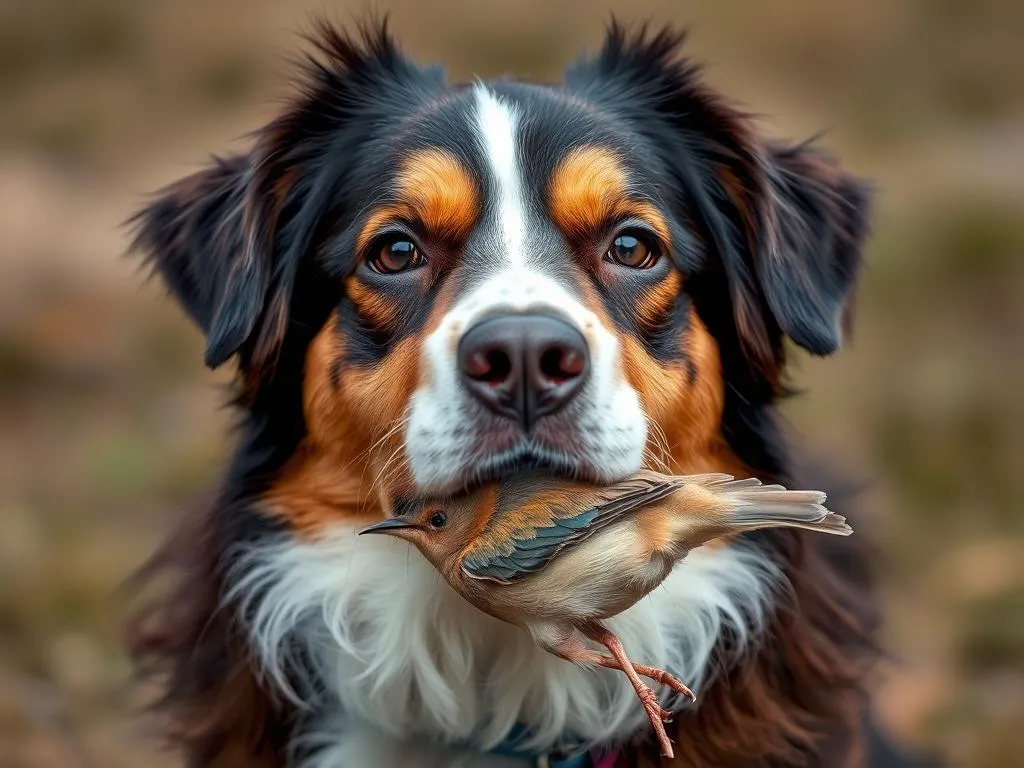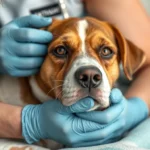
When a dog eats a dead bird, it’s common for pet owners to feel alarmed and unsure about what to do next. Understanding the potential health risks associated with this behavior is crucial for protecting your furry friend. This article aims to shed light on the dangers involved and provide clear guidance on how to respond if you find yourself asking, “my dog ate a dead bird vet answer.”
Understanding the Risks
Potential Health Hazards
Dogs are naturally curious and often scavengers. When they come across a dead bird, the instinct to investigate and potentially consume it can lead to serious health concerns. Here are some common diseases and parasites that may be transmitted from birds to dogs:
- Diseases: Birds can carry various pathogens that might be harmful to dogs. Common diseases include:
- Avian Influenza: Though rare in dogs, it is a serious viral infection.
-
West Nile Virus: Transmitted through mosquitoes but can be linked to birds.
-
Parasites: Eating a dead bird can expose your dog to various parasites, including:
- Worms: Such as roundworms or tapeworms, which can cause gastrointestinal issues.
-
Protozoa: Like Giardia, which can lead to severe diarrhea.
-
Bacterial Infections: Dead birds can harbor harmful bacteria, including:
- Salmonella: This bacteria can cause severe gastrointestinal distress.
- Campylobacter: Another common cause of foodborne illness in dogs.
Immediate Symptoms to Watch For
If your dog has eaten a dead bird, it’s essential to monitor them closely. Here are some immediate symptoms to watch for:
- Vomiting: This could be a sign of distress or infection.
- Diarrhea: Loose stools may indicate an upset stomach or infection.
- Lethargy: A sudden change in energy levels can be a red flag.
- Allergic Reactions: Watch for any signs of swelling or difficulty breathing.
- Behavior Changes: Any unusual behavior should prompt further observation.
What to Do Immediately After the Incident
Assessing the Situation
The first step after your dog consumes a dead bird is to assess their overall condition. Look for signs of distress, and consider how long ago the incident occurred. Keep your dog calm and prevent them from consuming anything else.
Contacting Your Veterinarian
It’s vital to seek professional advice as soon as possible. Contact your veterinarian to discuss the situation, emphasizing that your dog has eaten a dead bird. Provide the following information to help them assess the risk:
- The size and type of bird
- When your dog ate the bird
- Any immediate symptoms you’ve observed
First Aid Measures
While waiting to see your veterinarian, there are some first aid measures you can take, although inducing vomiting should be approached with caution:
- Do not induce vomiting unless instructed by a vet. In some cases, this can cause more harm than good, especially if your dog has ingested something sharp or caustic.
- Monitor your dog closely for any symptoms mentioned earlier.
- Keep your dog hydrated, offering fresh water to prevent dehydration.
Veterinary Assessment and Diagnosis
What to Expect During the Vet Visit
When you arrive at the veterinary clinic, your vet will conduct a thorough assessment. Expect the following:
- Physical Exam: The vet will check for any obvious signs of distress or illness.
- Diagnostic Procedures: They may recommend blood tests or fecal analysis to identify any underlying infections or parasites.
- Information Gathering: Share all relevant details about the incident, your dog’s health history, and any symptoms you’ve noted.
Potential Treatments
Based on the diagnosis, your veterinarian may recommend various treatments, which could include:
- Medications: Antibiotics may be prescribed for bacterial infections, while antiparasitic medication may be necessary for worms.
- Deworming: If parasites are identified, a deworming protocol will be initiated.
- Hospitalization: In cases of severe symptoms, your dog might need to be monitored overnight for hydration and treatment.
Prevention Tips for the Future
Training and Behavior Modification
To reduce the risk of similar incidents, consider implementing training techniques:
- Teach “Leave It”: Training your dog to leave objects on command can help prevent scavenging behavior.
- Leash Walking: Keeping your dog on a leash, especially in areas where dead animals may be present, can significantly reduce the chance of them eating something harmful.
Environmental Management
Proper management of your dog’s environment is crucial:
- Yard Maintenance: Regularly inspect your yard for any dead animals or hazardous materials.
- Keep Common Areas Clean: Encourage community efforts to dispose of dead wildlife promptly.
- Regular Vet Check-Ups: Routine veterinary visits and vaccinations can help protect your dog from various diseases.
Frequently Asked Questions
Can my dog get sick from eating a dead bird?
Yes, dogs can contract several diseases from eating a dead bird. Common risks include bacterial infections like salmonella and campylobacter, as well as parasitic infections from worms or protozoa. Always consult your veterinarian if your dog has ingested a dead bird.
How long should I monitor my dog after eating a dead bird?
It’s advisable to monitor your dog for at least 24 to 48 hours after the incident. Look for any signs of distress, such as vomiting, diarrhea, or lethargy. If symptoms appear, contact your veterinarian immediately.
What if my dog shows no symptoms?
Even if your dog shows no immediate symptoms, it’s crucial to maintain regular veterinary check-ups. Preventative care can help catch any potential issues before they become serious.
Are there any home remedies I can give my dog?
While some home remedies might be suggested for minor digestive upset, it’s essential to consult your veterinarian before administering any treatment. Home remedies may not effectively address the specific issues that can arise from eating a dead bird.
Conclusion
When faced with the alarming situation of your dog eating a dead bird, understanding the associated risks and knowing how to respond can significantly impact your dog’s health. Always seek veterinary advice promptly, monitor your pet for symptoms, and implement preventive measures to ensure their safety in the future. Responsible pet ownership and quick action can help safeguard your furry friend from potential harm.
By staying informed and prepared, you can effectively navigate emergencies and provide the best care for your beloved pet.









